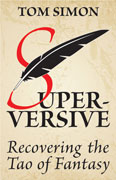The strawman fallacy in Utopian fiction
Of all the habitual fallacies and prejudices that have poisoned the wells of reason in our time, none, perhaps, has been so destructive as what Owen Barfield christened ‘chronological snobbery’. This is the strange belief that modern ideas and habits, simply because they are modern, are inherently superior to those of former times. This belief has become so prevalent that it is now recognized as a category of informal fallacy in itself. [Read more…]








Recent Comments